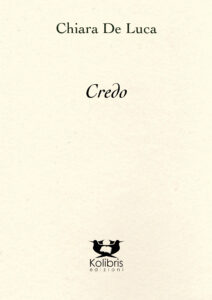 Collana Lady-Bird – Poesia italiana in traduzione
Collana Lady-Bird – Poesia italiana in traduzione
Chiara De Luca, Credo/I Believe
Traduzione inglese di Gray Sutherland
Prefazione di Elio Grasso
ISBN: 978-88-99274-89-4
pp. 130, Є 15
Questo è un libro delle corse uniformi e della ricerca di nomi da consegnare alla materia, mentre si espande intorno e il sangue scorre contrario agli abbandoni. Chiara De Luca non lascia parlare il vuoto ma si rivolge alle possibilità che un popolo arboreo possa affidare a chi solca i verdi misteri: varie le direzioni intraprese, le poesie di Credo non superano nulla ma avvicinano il viaggio terrestre al lettore con tutti i sentori e gli scatti. Cosa abbiamo qui? Una donna attraversa i campi, conosce i segreti ma li tiene per sé mentre porta in giro nudità comprensibilmente terrestri e tralci di elegia rientranti lungo gli anni. Nessun ritorno a naturismi ottocenteschi ma una grande attenzione all’alfabeto che sembra suggerire le cose stanche della loro invisibilità epocale. E appaiono improvvisamente le vestigia abbandonate, le mura su cui correre e avvertire gli improvvisi stagionali, il moto apparente delle stelle e tutto quanto “ha una forma” e tutto è nuovo. Se Dickinson appare di sfuggita, è per cautela e perché non impazzisca il verso in un mondo già fin troppo consegnato ai propri congegni: ma non estraneo a questa poesia, vi ritorna e vi abita sapendo d’avere dall’autrice confini precisi, nominati – dunque reali. È la corsa una porta d’ingresso, il rapido movimento che può scambiarsi fra chi sta dentro il libro e chi ne accoglie all’esterno i dettagli: l’invenzione del passaggio. Sarà un effetto fresco o tiepido (anche una sbronza), sarà l’esistenza della strada improvvisamente visibile a tutti.
Dalla Prefazione di Elio Grasso
This is a book about uniform routes and the search for names to give to matter while it spreads out and its blood flows counter to dejection. Chiara De Luca does not let the void speak but appeals to the possibilities that a treelike people may entrust to one who furrows green mysteries: however different the directions they engage in, the poems in Credo do not surpass anything but bring the reader’s earthly journey close to every inkling, every trigger. So what do we have here? A woman crossing the fields who knows secrets but keeps them to herself while she carries around understandably earthly nudities and twigs of elegies that recover as the years go by. There’s no return to nineteenth century naturalism here but there is great attention to the alphabet, which seems to suggest the tired objects of their epochal invisibility. And unexpectedly appear abandoned vestiges, walls to run along and glimpse unexpected seasonal workers, the apparent movement of the stars and everything that “has shape” and everything is new. If Emily Dickinson happens to appear, it is cautiously, so as not to make the line go crazy in a world already too set to its own devices: but not foreign to this poetry, it returns to it, lives in it, knowing that from the author it will obtain precise, well-named and therefore real borders. The journey is a front door, a swift movement that can change between who is inside the book and who gathers its details from outside: inventing the passage. The effect will be cool or lukewarm (also intoxicating), the existence of a street unexpectedly visible to everyone.
From the preface by Elio Grasso
Credo
nel sacro di ogni incontro
nell’irripetibile stagione di un momento
di Eterno presente che redime il tempo
e si possa entrare infine un cuore aperto
custodire il grido teso in ogni sguardo
tenére parole come canto che nel vento
soffia intensamente ponti tra le storie
sul mare di un silenzio enorme che non cede
quando più non frangono le onde dell’attesa
nel piegarsi a un fondo invano di memorie
I believe
in the holiness of every meeting
in the unrepeatable season of a moment
of the Eternal present that redeems time
and were it possible at the end to enter an open heart
to guard the tense scream in every look
to hold words like a song that in the wind
blows bridges intensely between stories
on the sea of a vast silence that does not yield
when the waves of waiting no longer break
folding down in vain on a bed of memories












